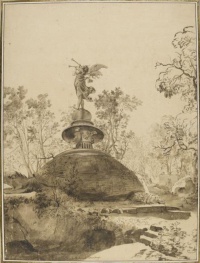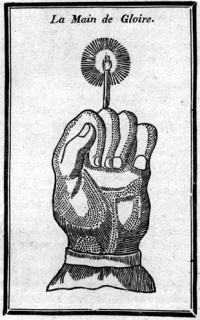Fantastique
From The Art and Popular Culture Encyclopedia

|
"Why can't I get enough of your weird fantastic pages, you cheeky master!"--"Jaques Callot" in Fantasy Pieces in Callot's Manner (1814) by E. T. A. Hoffmann "The metaphysicians of Tlön do not seek for the truth or even for verisimilitude, but rather for the astounding. They judge that metaphysics is a branch of fantastic literature." --"Tlön, Uqbar, Orbis Tertius" by Borges ""Schalken" conforms more strictly to my own ideals. It is indeed one of the best of Le Fanu's good things."--introduction to Ghosts and Marvels (1924) by M. R. James |

Illustration: Screenshot from A Trip to the Moon (1902) by Georges Méliès


|
Related e |
|
Featured: |
The fantastique is a term for a literary and cinematic genre of fiction, the parent category of which is speculative fiction.
Authors such as E. T. A. Hoffmann, Charles Nodier, Honoré de Balzac, Prosper Mérimée, Gérard de Nerval, Théophile Gautier, Auguste Villiers de l'Isle-Adam, Guy de Maupassant, Walter Scott, Nathaniel Hawthorne, Edgar Allan Poe, Ambrose Bierce, H. P. Lovecraft, Robert Louis Stevenson, Jorge Luis Borges and Julio Cortázar have been put in this category.
The term entered the French language via Walter Scott who in "On the Supernatural in Fictitious Composition" (1827), his assessment of the work of E. T. A. Hoffmann, uses the term fantastic to refer to a "mode of writing, in which the most wild and unbounded license is given to an irregular fancy", a sensibility Scott most readily perceives in the work of Hoffmann.
This essay was translated into French as "Sur Hoffmann et les compositions fantastiques" (1832) by François-Adolphe Loève-Veimars upon which the notion of the fantastique was further entrenched in French. But even before that Charles Nodier had written the critical piece "Du fantastique en littérature" (1830), the first text to trace the fantastique sensibility retro-actively.
In 1863 the term fantastique with reference to Hoffmann appears in the Dictionnaire de la langue française by Littré.
In 1940 The Book of Fantasy, an anthology curated by Borges, Casares, and Ocampo, is released in Spanish.
Roger Caillois's defines the fantastique in Au cœur du fantastique (1965) as "always a break in the acknowledged order, an irruption of the inadmissible within the changeless everyday legality" (tr. Richard Howard).
The term was particularly popular in the 1960s and 1970s; with the magazine Midi Minuit Fantastique (1962-1970) and the book series Marabout Fantastique (1969 - 1977).
When Todorov publishes The Fantastic: A Structural Approach to a Literary Genre (1970), he sets somewhat of a standard in the historiography of the genre.
Contents |
Definition
What is distinctive about the fantastique is the intrusion of supernatural phenomena into an otherwise realist narrative. It evokes phenomena which are not only left unexplained but which are inexplicable from the reader's point of view. In this respect, the fantastique is somewhere between fantasy, where the supernatural is accepted and entirely reasonable in the imaginary world of a non-realist narrative, and magic realism, where apparently supernatural phenomena are explained and accepted as normal. Instead, characters in a work of fantastique are, just like the readers, unwilling to accept the supernatural events that occur. This refusal may be mixed with doubt, disbelief, fear, or some combination of those reactions.
Literary theorist Tzvetan Todorov contends that the fantastique is defined by its hesitation between accepting the supernatural as such and trying to rationally explain the phenomena it describes. In that case, the fantastique is nothing more than a transitional area on a spectrum from magic realism to fantasy.
Fantastique literature is often erroneously considered close to science fiction. However, there is an important difference between the two: science fiction is situated in a different time and place than the reader, and irrational seeming events are actually held to be rational in the framework of future or perhaps alien science and technology.
The Fantastique is often linked to a particular ambiance, a sort of tension in the face of the impossible. There is often a good deal of fear involved, either because the characters are afraid or because the author wants to provoke fright in the reader. However, fear is not an essential component of fantastique.
References
- French Science Fiction, Fantasy, Horror and Pulp Fiction by Jean-Marc Lofficier and Randy Lofficier
- The Fantastic: A Structural Approach to a Literary Genre (1970) by Todorov
Anthologies
- Demons of the Night (1995) by Joan C. Kessler
- Black Water: The Book of Fantastic Literature (1984) by Alberto Manguel
- La grande anthologie du fantastique - Tome 1 (1996)
See also
- Fabulation
- Fairy tale
- Fantasy
- Fantasy literature
- Fantasy or fantastique?
- Fantastic art
- Ghost story
- Gothic fiction
- Grotesque
- Leugenliteratuur
- Midi Minuit Fantastique
- Psychological horror
- Science fiction
- Supernatural fiction
- Unreliable narrator
- Weird fiction


